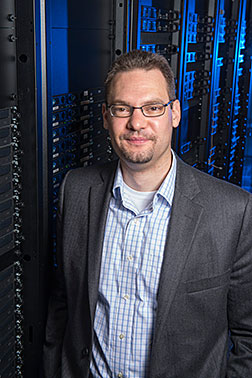- Number 426 |
- November 10, 2014
Fermilab’s Oliver Gutsche keeps LHC community computing

Oliver Gutsche.
Since he was a graduate student in Germany, Oliver Gutsche wanted to combine research in particle physics with computing for the large experiments that probe the building blocks of matter.
“When I started working on the physics data coming from one of the experiments at DESY, I was equally interested in everything that had to do with large-scale computing,” said Gutsche of his time at the German laboratory. Gutsche now works at DOE’s Fermi National Accelerator Laboratory. “So I also began working on the computing side of particle physics. For me that was always the combination I wanted to do.”
Gutsche’s desire to merge the two focuses has paid off. For the past four years Gutsche has been in charge of worldwide computing operations of the Large Hadron Collider’s CMS experiment, one of two experiments credited with the 2012 Higgs boson discovery. In December he was awarded the CMS Collaboration Award for his contributions to the global CMS computing system. And more recently, he has been promoted to assistant head of the Scientific Computing Division at Fermilab.
As head of CMS Computing Operations, Gutsche orchestrates data processing, simulations, data analysis and transfers and manages infrastructure and many more central tasks. Monte Carlo simulations of particle interactions, for example, are a key deliverable of the CMS Computing Operations group. Monte Carlo simulations employ randomness to simulate the collisions of the LHC and their products in a statistical way.
“You have to simulate the randomness of nature,” explained Gutsche. “We need Monte Carlo collisions to make sure we understand the data recorded by the CMS experiment and to compare them to the theory.”
When Gutsche received his Ph.D. from the University of Hamburg in 2005, he was looking for a job to combine LHC work, large-scale computing and a U.S. postdoc experience.
“Fermilab was an ideal place to do LHC physics research and LHC computing at the same time,” he said. His postdoc work led to his appointment as an application physicist at Fermilab and as the CMS Computing Operations lead.
Today Gutsche interacts regularly with people at universities and laboratories across the United States and at CERN, host laboratory of the LHC, often starting the day at 7 a.m. for transatlantic or transcontinental meetings.
“I try to talk physics and computing with everyone involved, even those in different time zones, from CERN to the west coast,” he said. Late afternoon in the United States is a good time for writing code. “That’s when everything quiets down and Europe is asleep.”
Gutsche expects to further enhance the cooperation between U.S. particle physicists and their international colleagues, mostly in Europe, by using the new premier U.S. Department of Energy’s Energy Sciences Network recently announced in anticipation of the LHC’s restart in spring 2015 at higher energy.
Helping connect the research done by particle physicists around the world, Gutsche finds excitement in all the work he does.
“Of course the Higgs boson discovery was very exciting,” Gutsche said. “But in CMS Computing Operations everything is exciting because we prepare the basis for hundreds of physics analyses so far and many more to come, not only for the major discoveries.” – by Richard BlausteinSubmitted by DOE's Fermi National Accelerator Laboratory
